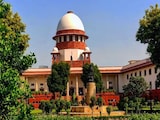The Centre on Wednesday defended its control over transfers and postings of officers in Delhi, telling the Supreme Court that it needs to have special powers over the administration in the capital of the country. Soon after, the Delhi government objected to the Centre's stance.
"Since Delhi is the national capital, it is necessary that the Centre has powers over appointments and transfers of public servants. Delhi is the face of the nation. The world views India through Delhi," the Centre told the Supreme Court.
The Supreme Court is hearing the Delhi government's petition against the Centre over the control of the civil services.
"The essential feature about Delhi's laws was guided by how the great capital of this nation would be administered. It was not meant to be about any particular political party," the Centre argued.
"Since it is the national capital, it's necessary that the Centre has special powers over its administration and has control over important issues," it said, adding that the laws about administering Delhi were meant to prevent any direct confrontation between the Centre and Delhi.
The Centre also referred to the Balakrishnan Committee report, which had concluded that it was "vital in national interest" for the Centre to have control over Delhi.
The case should be sent to a five-judge constitutional bench, said the Centre.
The Delhi government strongly opposed the suggestion.
"There is no need to refer the matter to a larger bench as being suggested by Centre," said Delhi government lawyer Abhishek Manu Singhvi.
"During the last two-three hearings, the central government has been arguing for sending this matter to the Constitution Bench. There is also no need to discuss the Balakrishnan committee report as it was rejected," Mr Singhvi said.
The Delhi government's response came after Chief Justice of India NV Ramana enquired about what earlier benches had said on the powers of the legislative assembly and sought the Delhi government's views on the Centre's suggestion.
Delhi's Aam Aadmi Party (AAP) government has long accused the Centre of using the Lieutenant Governor to control the capital and obstruct the decisions of the elected government.
The Centre had earlier told the Supreme Court that the Delhi government can be restricted from passing laws on subjects other than just land, police and public order.
The Centre had also demanded a fresh look by a Constitution bench to set the boundaries of the legislative powers of the AAP government.
A constitution bench of the Supreme Court in 2018 had ruled that police, land and public order are the domain of the Centre, and the rest is under the Delhi government.
But the Centre argued that the 2018 judgment did not mean that Delhi government is empowered to make laws on all subjects, apart from land, police, and public order.
The Centre's arguments in the case were eroding the federal structure of the constitution, said the Delhi government, and they left the Delhi legislative assembly quite meaningless.















